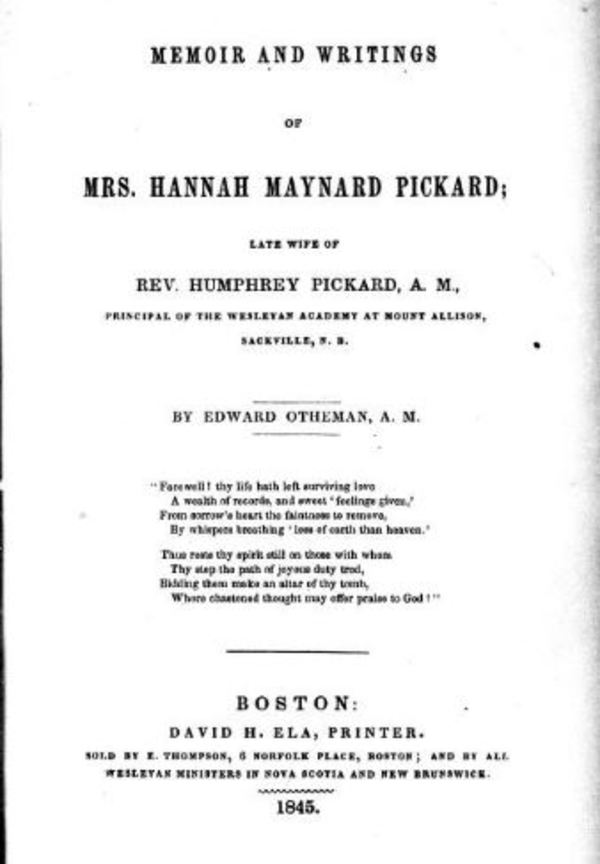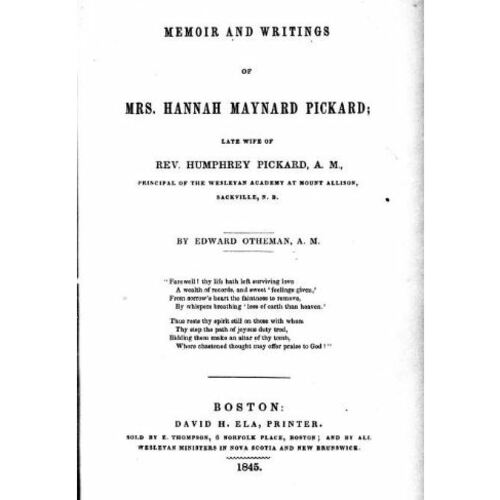
Source: Link
THOMPSON, HANNAH MAYNARD (Pickard), novelist and housewife; b. 25 Nov. 1812 in Chester, Vt, the youngest of four children of Ebenezer Thompson and Hannah Maynard; m. 2 Oct. 1841 the Reverend Humphrey Pickard* in Boston, and they had two sons who died in early childhood; d. 11 March 1844 in Sackville, N.B.
When Hannah Maynard Thompson was about three years of age she moved with her family from Chester, Vt, to Concord, Mass., where she remained for ten years. It was here that she received her first instruction in Methodism, to which her parents were ardently committed. During her childhood years she became known for her art of story-telling and for her interest in “books, observation, conversation and reflection.”
In the early spring of 1826, when Hannah was 13, Mr and Mrs Thompson moved to Wilbraham, Mass., to take charge of the Students’ Boarding Hall associated with the Wesleyan Academy there. Hannah attended the academy, where, in addition to the regular subjects taught, she began a formal study of Methodism. Two years later her family moved to Boston; she joined them in 1829 and resided in the capital, except for an interval at Wilbraham, until her marriage in 1841.
In Boston, where she taught for a time, Hannah Thompson’s interest in writing flourished. She wrote poetry, sketches (a favourite genre of the period), as well as prose fragments. Some of the sketches which are included in the Memoir and writings of Mrs. Hannah Maynard Pickard reveal her deep religious ardour and a growing appreciation of nature. “The little remembrancer,” “Farewell of the closing year,” “Beauty of contentment,” “‘Looking unto Jesus,’” and “The spider” are among the titles. The fragments, all of about one page, deal with such subjects as “Evening,” “Man alone ungrateful,” “The stormbird’s flight,” and “Prayer.” In Boston she also wrote and published her most ambitious works of prose, Procrastination; or, Maria Louisa Winslow (1840) and The widow’s jewels; in two stories (1844), both of which appeared anonymously as “By a lady.”
Procrastination is a moral tale of 115 pages in which the certainty of the uncertainty of life and “the danger of delaying its highest interests” are the central themes. Maria, a “fashionably educated” 17-year-old who is fond of Boston’s gay winter season, finds herself unable to learn from the religious experiences of others. Because of her predilection for new clothes, dancing, and fashionable parties, she fails, through delay, to bring happiness to Elizabeth, a sick friend. She becomes suddenly ill herself and dies, still a victim of her inability to “fix upon [her] thoughts the dangers of that evil most fatal to the soul –procrastination.” The author asserts that the story is true and that only the names and dates have been changed. The widow’s jewels, which appeared posthumously, is addressed to “little readers” and in its two stories, “Robert McCoy” and “Dennis Brooks,” the author endeavours to bring home to new readers the fact that “there are gems of greater price” and these gems are the children of God.
In 1838 Hannah Thompson was invited to be preceptress in the Wilbraham academy. After some hesitation she accepted. According to her memorialist, “Her success was most signal and gratifying, and far greater than her modesty led her at any time to hope.” Her work involved the supervision and instruction of over one hundred young women “of all moods and manners.” It was at Wilbraham that she first met her future husband, Humphrey Pickard, then a student at Wesleyan University in Middletown, Conn. Hannah and Humphrey kept in touch by letter after his return to New Brunswick.
On 18 March 1841 Hannah’s mother died. Following this loss, which affected her deeply as recorded in her letters to Pickard and in her journal, Hannah Thompson’s life took on new dimensions. At the end of the spring term in 1841 she gave up her teaching position at the Wesleyan Academy and returned to Boston to keep house for her father. Her importance in the life of the academy was such that the principal travelled to Boston to urge her to return and delay her forthcoming marriage to Humphrey Pickard. She refused and the wedding took place in the Bromfield Street Church, Boston, on 2 Oct. 1841. Soon after, the couple left for Saint John, N.B.
On 7 Sept. 1842 the Pickards’ first son, Edward Dwight, was born in Chelsea, Mass., where Hannah was visiting with relatives. She and the baby returned to Saint John on 29 October. Shortly afterwards, Mr Pickard was named principal of the Wesleyan Academy, newly built in Sackville [see Charles Frederick Allison*]. The Pickards moved there in January 1843. From then on Hannah’s time was consumed with her new life in Sackville and all the demands implicit in the founding of an educational institution. She not only supported her husband’s responsibilities as an administrator and a Methodist preacher, but also took charge of the domestic arrangements for the academy’s students.
In 1844 the Pickards were expecting their second child. A boy, Charles Frederick Allison, was born on 19 February. He lived just a week. In less than a month, on 11 March, Hannah Pickard died at the age of 32. “Her sainted spirit is at rest,” wrote the Reverend Samuel Dwight Rice*, agent of the academy. His was but one expression of the widespread grief felt by the Methodist community of which Hannah Pickard was a dedicated and well-loved member. Her elder child survived her by only two years.
An appreciation of Hannah Maynard Thompson by her brother-in-law, Edward Otheman, entitled Memoir and writings of Mrs. Hannah Maynard Pickard; late wife of Rev. Humphrey Pickard, A.M., principal of the Wesleyan academy at Mount Allison, Sackville, N.B., was published in Boston in 1845. It contains much correspondence by Hannah and Humphrey Pickard and others, as well as poems, sketches, and fragments selected from Hannah’s writings.
Cyclopædia of Canadian biog. (Rose and Charlesworth), 1: 140–42. N.B. vital statistics, 1842–45 (Johnson). Watters, Checklist of Canadian literature (1972).
Cite This Article
Douglas Lochhead, “THOMPSON, HANNAH MAYNARD (Pickard),” in Dictionary of Canadian Biography, vol. 7, University of Toronto/Université Laval, 2003–, accessed November 10, 2025, https://www.biographi.ca/en/bio/thompson_hannah_maynard_7E.html.
The citation above shows the format for footnotes and endnotes according to the Chicago manual of style (16th edition). Information to be used in other citation formats:
| Permalink: | https://www.biographi.ca/en/bio/thompson_hannah_maynard_7E.html |
| Author of Article: | Douglas Lochhead |
| Title of Article: | THOMPSON, HANNAH MAYNARD (Pickard) |
| Publication Name: | Dictionary of Canadian Biography, vol. 7 |
| Publisher: | University of Toronto/Université Laval |
| Year of revision: | 1988 |
| Access Date: | November 10, 2025 |



